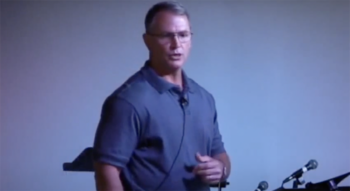By Mark Ellis —

USAF fighter pilot Richard Haines became a test pilot and instructor, following in the footsteps of a proud tradition of military service in his family.
One day, he happened to be instructing a foreign student from the backseat of an AT-38 when they lost utility hydraulic pressure, the left generator fell off-line, and the left engine firelight came on.
He found himself with a single engine and minimal fuel, but in the midst of the inflight emergency, his foreign student forgot how to speak English.
This “emergency” happened in a simulator, but a few months later, a very similar situation happened in a real jet, with a real foreign student, and Haines handled it well because of his prior training.
“There are a lot of lessons I learned as a fighter pilot that transfer into the Christian walk,” Haines told God Reports. “When things hit the fan, so to speak, the flying of the airplane or your Christian walk needs to be habitual, it needs to be something you don’t have to think about.”
 Haines is the author of Spiritual Wingman: A fighter pilot’s journey to God. In addition to recounting his Christian testimony, he describes eight need-to-know categories that helped him succeed as a pilot and relate to his walk with Christ.
Haines is the author of Spiritual Wingman: A fighter pilot’s journey to God. In addition to recounting his Christian testimony, he describes eight need-to-know categories that helped him succeed as a pilot and relate to his walk with Christ.
“You need to be able to focus on what the enemy jet is doing. You have to know his tools, his weapons, what his capabilities are, how he attacks us, and what his endgame is trying to be, and then how to counter that with our weapons,” he explains.
With Satan prowling like a lion – targeting Christian leaders — they must be prepared. “You need to be ready to a point where you know that you’re going to be launched into trouble on purpose. And sometimes the Christian walk is like that. You’re going to be put into certain circumstances on purpose for either your education or for somebody else’s education as they watch you go through it.”
The simulator training helped him as things invariably went awry. “You’ve got to practice those emergency procedures. In my later pilot life, I was flying a bunch of broken airplanes. And there was a lot of emergencies that I had never seen before.
“The Christian life can be like that.”
Haines’ wife helped him edit the book. “There was a lot of stuff in there she didn’t know. Because when I would come home from flying and say, ‘I almost died today,’ she said, ‘I don’t want to hear that anymore.’
“Okay,” he replied. “I just promise I will never die from ignorance or stupidity.”
When she read the manuscript about some of his hair-raising experiences, she was “taken aback,” because he honored her request and shielded her through the years.
In his book, Haines reveals some areas of vulnerability that affected his marriage. “I’ve learned what my temptations are, and I’ve learned to avoid them,” he says.
“I used to go to the gym and women would always come up and say ‘Hey, can you spot me’ or whatever, and it would turn into a conversation. I decided this wasn’t going to work. So from that point on, the gym has been in my house. That solved the problem.”
Haines leads a home fellowship and is also a teetotaler, because he wants to be ready and alert for needs that arise. “If you know anything about pastors, they’re on call 24/7. I feel like I need to be ready to answer the call at any time, so I can’t get a call in the middle of the night and say, ‘Sorry, I just had a glass of wine.’
“The emergency procedures section in most fighter-type flight manuals can be, by far, the largest section. There is so much that can, and often does, go wrong,” he notes in his book.
“At the top of my list for pilots and Christians alike, and the ones that get my respect, are the ones that are consistent and handle adversity well. Any Christian can act correctly when times are good.
“How do we act when times are tough, or during personal trials?”
For more about Haines’ book, go here



